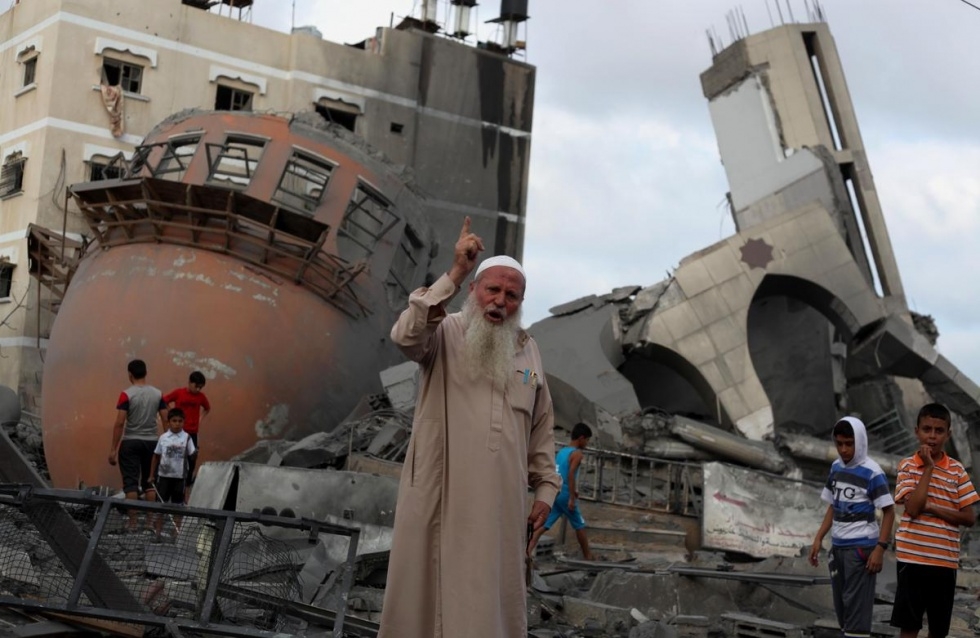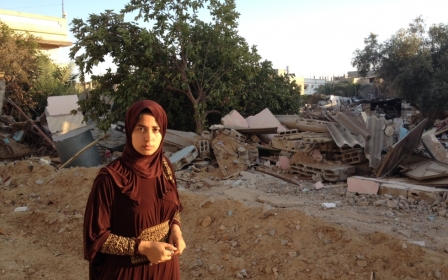Gaza: ‘It’s like the aftermath of a hurricane’

ALFAKHARI, KHAN YOUNIS - “I am 70 years old, yet feel as though I was born today,” said Mahmoud Abu Hadaeid, while surveying what is left of his family home. Abu Hadaeid is a well-respected man, known for his wisdom, and lives in Alfakhari village, Khan Younis.
He made the decision to flee his home, under gunfire, to a UN school shelter, but then decided to leave and return home to build a tent, made from whatever bed linens and blankets he could salvage, to protect him and his family from the scorching heat of the day.
“I have lived through all wars, but this war is different from previous wars in that Israel focuses more on breaking bones and stones,” said the old man surrounded by his children, as a fresh breeze blew around the remains of his home, which was recently destroyed by Israeli military attacks.
This is one of the most marginalised areas in the Gaza Strip, most families here rely on farming and agriculture, the produce of which they use to supply Gaza’s vegetable markets. The people in this village live about 3km away from the Israeli border fence. Now, even under the ceasefire, Israeli tanks and bulldozers can be heard moving around nearby. The location of the area did not afford it constant media attention - emergency help in getting injured and dead people to the nearest hospital took longer than in other areas.
No stone untouched
“It’s like the aftermath of a hurricane - silent like a graveyard with no signs of real life - no one would recognise our family home, lived in for 45 years and renovated by my children. But, it’s all history now,” said Abu Hadaeid. The smell of bodies decaying under the rubble and dust is very strong - bodies of friends and neighbours not yet able to be recovered, as there is such a high demand for heavy machines to dig people out.
“Israeli troops left no humans, trees, or stones untouched,” he said. All that’s left are the ruins he sits on, with memories lying buried underneath. They decided to leave after Israeli F16s dropped leaflets, demanding all residents leave their homes immediately.
“The Israeli troops broke into the house, and occupied it for several days,” said Abu Hadaeid. “We had no option but to go to the Gaza European Hospital for shelter.” When they fled, he, his wife and 21 children/grandchildren had to run fast, dodging the Israeli bombs falling around them. He stumbled across his neighbour’s donkey, lying on the ground bleeding from shrapnel in its neck.
“The night before the 72-hour ceasefire was announced, my house was still standing,” said Abu Hadaeid. “Now it looks like it’s been blown up by dynamite.” He keeps watch on his home from a distance, waiting for Israeli tanks and bulldozers to stop moving, for the sand and dust to settle, and maybe some calm to return.
Abu Hadaeid and his wife have dug under the destroyed house - but not much can be identified from their personal belongings.
“This is where the soldiers ate - see the food cans with Hebrew writing on, and also the blue plastic bags holding their shit, left behind, over there,” he said, grimacing.
One of his children was able to retrieve a gas cylinder, found a couple of hundred metres away from the site.
His wife, Umm Hani, 70, spent hours searching for some personal gold items inherited from her mother and grandparents - a habit developed - like many families - of passing personal heirlooms from one generation to the next.
She struggled to find something to keep for her grand-daughter to pass on to the next generation.
“I can’t retrieve anything from these ruins,” she said, as she continued to search for some gold and money left by a mother she knew, who had asked her to keep it safely for the education of her orphaned child.
Grandfather Hadaeid has a new problem too: the injustice of aid distribution, which he views as based on favouritism and family affiliation. With some loaves of bread, milk and bits of tomatoes from a nearby farm, he is able to make a small meal, but the portions are nowhere near what he needs for the family.
He misses the tea kettle - a symbol of hospitality and friendship for him over the years. He used to enjoy sitting around the fire, making tea, swapping stories and resolving social disputes between families.
“All is well,” he said, as he knocked on a piece of broken wooden shelf. “After all, my children and grandchildren are all unhurt, which is the priority.”
Hadaeid fled the unbearable overcrowded conditions at Al Khalidi UNRWA School, and made the decision to return home. He said that Israel may have won a game over stones, but it failed in breaking his will to remain.
He said: “We have nowhere else to go - but I’d rather die here instead of going back to the UNRWA schools where you can’t get a clean toilet or bathroom to even prepare for prayers.”
Stay informed with MEE's newsletters
Sign up to get the latest alerts, insights and analysis, starting with Turkey Unpacked
Middle East Eye delivers independent and unrivalled coverage and analysis of the Middle East, North Africa and beyond. To learn more about republishing this content and the associated fees, please fill out this form. More about MEE can be found here.




